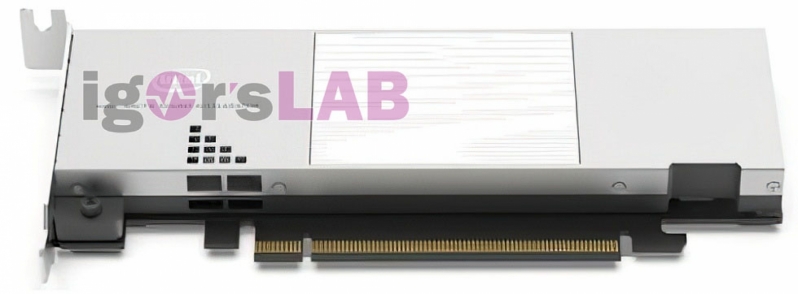Intel Arctic Sound Accelerators Pictured – Up to 7680 Xe Cores Reported
Intel Arctic Sound Accelerators Pictured – Up to 7680 Xe Cores Reported
With Arctic Sound, Intel’s ambitions were high, a tile-based GPU design that can deliver scalable performance across multiple GPU/accelerator chips to deliver tremendous performance numbers. Thanks to Igor’s Lab, we have gotten a look at the company’s 1T and 2T HPC accelerator cards.Â
Intel’s 1T and 2T naming scheme isn’t difficult to decipher, standing for 1-Tile and 2-Tile, respectively. Strangely, Intel’s long-teased 4-Tile Arctic Sound variant is a no-show, suggesting that Intel’s Arctic Sound Accelerators have been facing production issues.Â
Arctic Sound reportedly relies on high-speed HBM2E memory, with each tile featuring 16GB of the high-speed memory type. This gives each accelerator tile access to 716 GB/s of bandwidth.Â
Intel’s 1T setup reportedly features a TDP of 150W, offering users 384 usable Execution Units (EUs) out of a total of 512. Igor’s Lab suggests that Intel is running into yield issues with their Arctic Sound silicon, resulting in non-peak EU counts and lower clock speed/power targets.Â
With 8 shader units per Execution Unit, Intel’s 1T arctic Sound Accelerator will feature 3072 shaders. Intel’s Arctic Sound Accelerators reportedly use a PCIe 4.0 interface and feature no display outputs.Â
 Â
 (Intel Arctic Sound 1T – Image from Igor’s Lab)Â Â
(Intel Arctic Sound 1T – Image from Igor’s Lab)Â Â
Â
Intel’s 2T Arctic Sounds Accelerators are a lot more impressive than their 1T model, offering two tiles with 480 Execution Units each. This gives the accelerator a total of 32GB of HBM2E memory and a total of 7680 (2×3840) shaders. This is still below Arctic Sound’s theoretical Peak of 512 EUs (4096 shaders) per tile but a lot closer to peak die utilisation.Â
With a TDP of 300W, Intel’s 2T Arctic Sound Accelerator requires an 8-pin EPS connector for power, a connector type that is commonly used for CPUs in the consumer market.Â
(Intel Arctic Sound 1T – Image from Igor’s Lab)Â Â
These leaks suggest that Intel has toned down their ambitions for Arctic Sound but highlights that the company has a functioning multi-tile graphics card working in-house.Â
You can join the discussion on Intel’s Arctic Sound Xe-HP Accelerators on the OC3D Forums.Â




